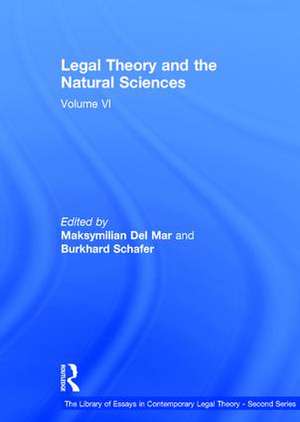Legal Theory and the Natural Sciences: Volume VI: The Library of Essays in Contemporary Legal Theory - Second Series
Autor Burkhard Schafer Editat de Maksymilian Del Maren Limba Engleză Hardback – oct 2014
Preț: 1112.99 lei
Preț vechi: 1563.63 lei
-29% Nou
Puncte Express: 1669
Preț estimativ în valută:
212.96€ • 222.36$ • 176.26£
212.96€ • 222.36$ • 176.26£
Comandă specială
Livrare economică 14-28 martie
Doresc să fiu notificat când acest titlu va fi disponibil:
Se trimite...
Preluare comenzi: 021 569.72.76
Specificații
ISBN-13: 9781409452225
ISBN-10: 1409452220
Pagini: 546
Dimensiuni: 174 x 246 x 41 mm
Greutate: 1.28 kg
Ediția:1
Editura: Taylor & Francis
Colecția Routledge
Seria The Library of Essays in Contemporary Legal Theory - Second Series
Locul publicării:Oxford, United Kingdom
ISBN-10: 1409452220
Pagini: 546
Dimensiuni: 174 x 246 x 41 mm
Greutate: 1.28 kg
Ediția:1
Editura: Taylor & Francis
Colecția Routledge
Seria The Library of Essays in Contemporary Legal Theory - Second Series
Locul publicării:Oxford, United Kingdom
Cuprins
Contents: Introduction: of empires and revolutionaries. Part I Science, Realism and Naturalism: Law & geometry: legal science from Leibniz to Langdell, M.H. Hoeflich; Rules of law, laws of science, Wai Chee Dimock; Naturalizing jurisprudence: three approaches, Brian Leiter. Part II Science on Trial: Commentary: science at the bar - causes for concern, Larry Laudan; Response to the commentary: pro judice, Michael Ruse; Commentary: science v. creation-science, William A. Thomas; Two stories of the Scopes trial, Lawrance M. Bernabo and Celeste Michelle Condit; The evolving role of the courts in educational policy: the tension between judicial, scientific, and democratic decision making in Kitzmiller v. Dover, Benjamin Michael Superfine. Part III Proof and Truth: Trial by mathematics: precision and ritual in the legal process, Laurence H. Tribe; Irreconcilable differences? The troubled marriage of science and law, Susan Haack; A science of evidence: contributions from law and probability, David A. Schum. Part IV System and Change: Gödel and Langdell - a reply to Brown and Greenberg’s use of mathematics in legal theory, David R. Dow; The zones of cyberspace, Lawrence Lessig; Rationality and the taming of complexity, Ronald J. Allen; Legal evolution: integrating economic and systemic approaches, Simon Deakin. Part V Science and Legal Concepts: The jurisprudence of genetics, Rochelle Cooper Dreyfuss and Dorothy Nelkin; The biology of culpability: pathological identity and crime control in a biological culture, Nikolas Rose; Philosophical foundations of law and neuroscience, Michael S. Pardo and Dennis Patterson; Responsible choices, desert-based legal institutions, and the challenges of contemporary neuroscience, Michael S. Moore. Name index.
Notă biografică
Maksymilian Del Mar is Reader in Legal Theory at Queen Mary University of London and Burkhard Schafer is Professor of Computational Legal Theory at the University of Edinburgh, UK.
Descriere
This collection brings together the most important and influential papers theorising the changing relationship between law and science. The articles span historical overviews of the attempts by legal scholars to model legal science on scientific methodology, and the efforts by legal philosophers scrutinising the claims made on behalf of genetics and neuroscience as to their implications for law and legal concepts. The volume strikes a balance between those that seek to protect law’s autonomy against the perceived unwelcome inroads of science, and those that seek to shape and change law by incorporating the latest scientific developments.


